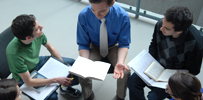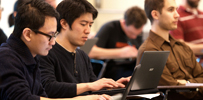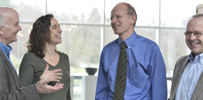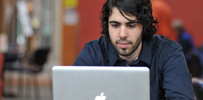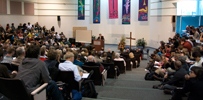Regent Alumni Start New Trinitarian Ontologies Conference at Cambridge

Cambridge’s upcoming New Trinitarian Ontologies conference is culturally urgent, well-visioned, and bursting at the seams with some of the world’s leading theologians. And we are proud to say that a group Regent alumni are behind it!
Alex Abecina (MATS ’12), Jonathan Lyonhart (MATS ’18), and Austin Stevenson (MATS ’16; THM ’17) are three of the conference’s four founding members. The speakers will include, among many others, David Bentley Hart, Rowan Williams, John Milbank, Catherine Pickstock, Cyril O’Regan, Graham Ward, Judith Wolfe, Piero Coda, Andrew Louth, and Celia Deane-Drummond.
Among their studies and conference organizing, Austin, Jonathan, and Alex found time to answer a few of our questions. Find out why they think this topic is essential and get some intel into the underground Regent faction at Cambridge.
This conference looks incredible! How did the vision for the event arise?
Our inspiration for the conference arose from the conviction that theology cannot ignore ontology, and ontology cannot ignore the Trinity. Ontology deals with questions such as: What is Being? Is there an ultimate source of Being that underlies and unites the particular world of diverse beings? Are there absolutes at the heart of existence, such that nature, morality, or aesthetics are grounded upon something permanent (instead of hanging midair, as if suspended by nothing at all)? Our vision for the conference comes from a shared sense that the doctrine of the Trinity answers these questions in much more satisfying ways than attempts that either reject or simply ignore this doctrine, as many modern approaches to ontology have done. Of course, none of this planning would have come together had our good friend Ryan Haecker not called a meeting at the Anchor pub in Cambridge with Jonathan and Alex. Austin joined soon after to add a boost to the team.
What is it about the
field of Christian ontology that you find essential?
On the one hand, ontology allows theologians to speak coherently about God, created reality, and the relationship between the two. If we are not intentional about our ontological categories, then we will simply import them from somewhere else. There are many examples, especially in the modern period, of ill-formed ontological commitments undermining theology.
On the other hand, ontology is vital for engaging beyond the hallowed walls of theology proper. Part of the reason for such an interdisciplinary conference is that we wanted to show how trinitarian ontology relates to a wide range of questions in the broader fields of literature, ecology, art, science, history, and ethics. If we want theology to have a voice in important philosophical, ethical, and political discussions happening today—both in the academy and in the public sphere—we need a robust and compelling approach to ontology that reveals the ways in which our beliefs about ultimate things impact our understanding of concrete issues across the board.
This is a pretty
diverse and impressive lineup of speakers. How did you pull that off?
We’ve had plenty of interest from people all over the world wanting to be involved in this conference, so securing a stellar line-up has actually been one of the easier parts, believe it or not. The real challenge with academic conferences, as we've very quickly discovered, is getting the right funding. This can be quite competitive, so thankfully we have benefited from the wisdom of our senior colleagues along the way on where to find it, both within Cambridge and externally. We have also discovered that a successful conference is not only built on quality speakers and finances, but on solid logistical planning to deal with things like budgeting, hotel and room bookings, social media, international banking, etc.—all the “real life” skills that academics are not always known for but which we've been able to pool together from our collective skill set.
Which speakers are
each of you most hoping to see or connect with?
Austin: One of the speakers whom I haven’t met and am excited to connect with is Thomas Joseph White. His recent work on Thomist Christology is simply outstanding and has been hugely influential on my own work.
Alex: I'm really excited to hear from Judith Wolfe from the University of St. Andrews. I've listened to some of Judith's lectures online, but never on trinitarian theology. I'm also hoping to catch up again with Giulio Maspero from the Pontifical University of Santa Croce in Rome, whose work I've benefited from both during my Regent College MA and in my doctoral studies. On top of that, he is just a really friendly guy.
Jonathan: While there are a number of speakers whose work overlaps with my own in interesting ways, I think what I am most excited for is not an individual speaker but for the ‘meeting of the minds’; for the panel discussions where we get to see these diverse voices and personalities bouncing off of each other. I think this cross-pollination has the potential to be the conference's most lasting contribution to the field.
What do you hope is
the result of the conference? Will there be a publication or recordings? A livestream?
A publication of conference proceedings has definitely been discussed with a publisher, but we are still in the initial stages. We are not yet sure if the conference will be livestreamed but are continuing to look into ways to make the conference even more accessible internationally. We currently have registered guests from over 20 nations, so the desire to engage with the conference is definitely there on an international level, and livestreaming is just one of the ways we are considering meeting that desire.
Did you three know
each other before organizing the conference together?
We did! Jonathan and Austin took classes together at Regent and connected with Alex through a dinner for Regent grads at Cambridge. Organizing the conference together was the result of friendships that had already formed, rather than the other way around.
Is there an
underground Regent alum cabal at Cambridge?
There is a strong connection between Regent and Cambridge, and the Regent community here is wonderful. The year we started there were five Regent alumni beginning various postgraduate degrees at Cambridge, and there were already a number of Regent alumni in the Divinity Faculty, including Janet Soskice who just retired as Professor of Philosophical Theology. Many of us were greeted upon arrival by former “Regenters” who helped us carry our luggage and even hosted us for a few nights until our accommodations were settled. I remember attending a senior seminar early on and realizing that about eight of the eleven people around the table were from Regent! And that clearly has an impact on the ethos here at Cambridge. Don Lewis and Jens Zimmermann have also visited us in Cambridge for a few of our Regent get-togethers.
In a few words (impossible, I know!), what are each of you working on at Cambridge?
Jonathan: I’m working on early modern philosophies of space, particularly those that ground the absoluteness of space upon the absoluteness of God (e.g., Newton, More). My project looks at the subsequent secularization of this divine space, questioning if modern physics is built upon a metaphysical foundation that cannot simply be cut at the root without undermining the project itself. I also look at how this relation of God and space might be impacted by Einstein’s relativization of spacetime. This all sounds kind of technical, but it’s actually quite exciting (at least to me!) and enables me to do interdisciplinary work in philosophy, history, religion, and science.
Austin: I’m working on the connection between metaphysics and historiography in Historical Jesus Studies. Part of that involves unearthing and critiquing the metaphysical presuppositions that have driven the development of historiographical method in the discipline. Then the bulk of my project is a constructive theological proposal, drawing on the thought of Thomas Aquinas, exploring what Christian participatory ontology and the confession of Jesus as fully God and fully man mean for thinking about Jesus as a historical figure.
Alex: I am working on Gregory of Nyssa’s Homilies on the Song of Songs. The argument for my thesis centres on his christology and pneumatology. I have a recent article on this in Modern Theology borne out of my research in Cambridge over the past year. That’s all I can say about my project for now as it’s very much still marinating. Beyond my thesis topic I’ve taken a recent interest in the philosophy of science of wellbeing, and I continue to dabble in theology, science, and naturalism, which goes back to my original training in physics.
Congratulations on what looks to be a deeply worthwhile event and blessings on your futures as academics!
Get more information on the conference here.
